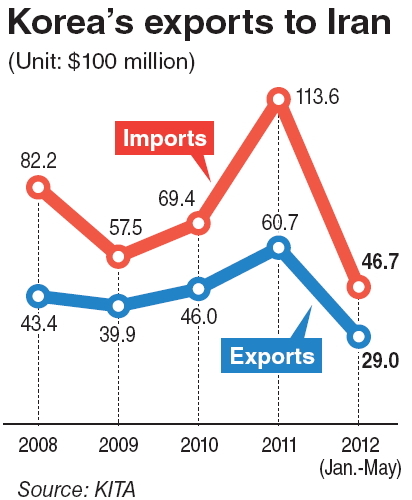Government maps out contingency plan to contain fallout from possible embargo
About 600 Korean companies may face financial difficulties if Iran halts all Korean imports in protest of Seoul’s decision to ban Iranian oil following European Union sanctions, analysts said Wednesday.
The Iranian Embassy to Seoul has said the country may stop Korean imports if Seoul imposes the import ban on Iranian oil.
If Iran implements the ban, Korea’s small and mid-sized enterprises trading with the country could be severely damaged, Seoul officials argued. The number of Iran’s SME trading partner comes to more than 2,500.
More than 600 out of the 2,500 local firms see the ratio of their exports to Iran ― or dependency on Iran in their respective exports ― exceed 50 percent, according to the Ministry of Knowledge Economy.

Korea’s exports to the country have been on a upward trend over the past few years ― $4 billion (4.6 trillion won) in 2009, $4.6 billion in 2010 and $6 billion in 2011.
The ministry is mapping out contingency plans to minimize damage from the feasible scenario, which may help the SMEs diversify export destinations.
The EU decided to impose the embargo on Iranian crude oil starting last Sunday as planned, signaling setbacks in crude supply to Korea and a rise in petroleum product prices.
The EU said in a statement that all contracts for importing Iranian oil will have to be terminated from July 1. European companies will also be prohibited from insuring shipping companies that transport Iranian oil as part of the sanctions aimed at making the Middle Eastern country give up its nuclear program.
Crude oil tankers are required to have insurance on their cargo, hulls and for protection and indemnity. Because of their potential danger, uninsured tankers are not allowed to pass through any territorial waters.
Korean shipping firms will be unable to operate tankers carrying Iranian crude from July 1 since all of them are partially insured by European companies.
Iranian oil accounted for 9.4 percent of Korea’s crude oil imports ― or 87 million barrels out of the total 930 million barrels ― last year.
In the current situation, the hike in gasoline prices may be unavoidable. Analysts predict the price level will rise by at least 200 won up to 300 won per liter.
The EU’s sanctions on Iran could result in an imbalance of the global crude supply and demand and an increase of oil prices, weighing on the Korean economy and exacerbating Korea’s trade terms with Iran, the Ministry of Knowledge Economy said in a recent statement.
By Kim Yon-se (
kys@heraldcorp.com)





![[Exclusive] Hyundai Mobis eyes closer ties with BYD](http://res.heraldm.com/phpwas/restmb_idxmake.php?idx=644&simg=/content/image/2024/11/25/20241125050044_0.jpg)
![[Herald Review] 'Gangnam B-Side' combines social realism with masterful suspense, performance](http://res.heraldm.com/phpwas/restmb_idxmake.php?idx=644&simg=/content/image/2024/11/25/20241125050072_0.jpg)

